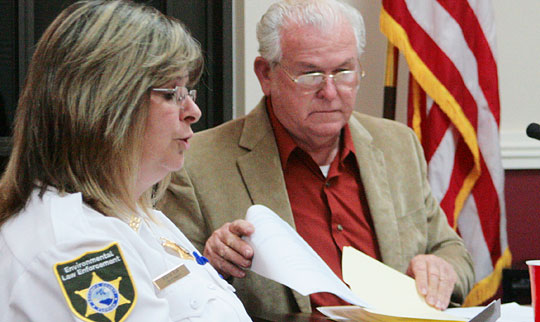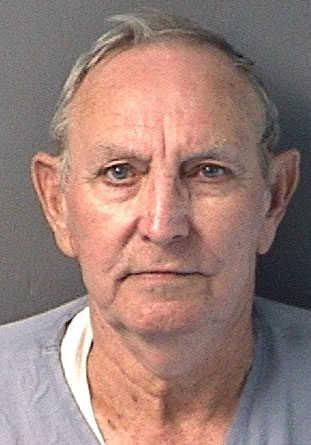Escambia Set To Approve New Code Enforcement Agreement With Century
September 1, 2011
Escambia County is expected to approve an amended agreement allowing for expanded code enforcement operations in Century — an amendment that the town says will allow them to shut down a business operating illegally in a residential neighborhood.
Century’s current interlocal agreement with Escambia County enacted in 2009 does not allow for enforcement of zoning issues. Under the new agreement, county code enforcement will enforce zoning issues at Century’s expense. Nuisance violation enforcement will continue at no cost to Century, covered by a Community Development Block Grant.
We have a severe zoning issue in the town,” Century Mayor McCall said at a recent town council meeting. “You’ve got one house that is in the residential area that has junk piled up. He’s running a business…in a residential place.”
George W. Philyaw says what he does behind his privacy fence at 120 front street is recycling, while the town says he is operating a junkyard on property that is zoned residential. Over a year ago, the Century Town Council cited regulations against “spot zoning” and denied Philyaw’s request to rezone the property for a recycling business.
At issue with 120 Front Street, according to the town, is whether or not Philyaw is operating a business on property that is zoned residential — not if the alleged business is a junkyard or recycling operation February of this year, the town council instructed Mayor Freddie McCall to contact Escambia County’s Code Enforcement and seek a cease and desist order against Philyaw and the alleged business he operates.
 But Sandra Slay, director of Escambia County Code Enforcement, said at that time that the current interlocal agreement between Century and Escambia County does not allow for the enforcement of issues like zoning, solid waste violations and stormwater.
But Sandra Slay, director of Escambia County Code Enforcement, said at that time that the current interlocal agreement between Century and Escambia County does not allow for the enforcement of issues like zoning, solid waste violations and stormwater.
The new agreement with Escambia County does not change any of the laws on the books, McCall said; it just gives Escambia County Code Enforcement the right to enforce the current laws.
McCall makes no secret that Philyaw is the current target of the town’s new interlocal agreement with Escambia County, but he said the agreement would allow the town to use code enforcement to pursue any future zoning violators.
“That is the only issue we have at this time,” McCall said.
The Escambia County Commission will consider the amended code enforcement with Century at their regular September 1 meeting. To read the amended agreement, click here.
Court Tosses Life Sentence For Bratt Child Molester
September 1, 2011
A state appeals court has tossed out a life sentence handed down to a 73-year old Bratt man convicted of molesting a five-year old North Escambia girl.
 Jody Posey received the life sentence in early 2010 from Escambia County Circuit Court Judge Kenneth Williams after being convicted by an Escambia County jury on charges of lewd or lascivious molestation of a child under 12.
Jody Posey received the life sentence in early 2010 from Escambia County Circuit Court Judge Kenneth Williams after being convicted by an Escambia County jury on charges of lewd or lascivious molestation of a child under 12.
The Florida First District Court of Appeals found that the life sentence handed down by Judge Williams was improper and sent the case back to Escambia County Circuit Court for resentencing before a different judge. In quashing the life sentence, the District Court of Appeals found it violated the precedent set forth by another case in which the judge erred by appearing to punish the defendant for failure to show remorse for a crime in which he denied involvement.
Posey’s conviction stands; he will appear before Judge Michael Allen for resentencing on September 9.
He was arrested March 5, 2009, for fondling a five-year old girl at his residence at 7100 North Pine Road in Bratt between November 2007 and January 2009.
The child victim took the witness stand and testified about Posey touching her underneath her clothes as she sat on his lap. The most recent molestation reported by the five-year old was January 9, 2009. The girl told officials that Posey said she would go to jail if she told anyone about the incidents.
Posey was also convicted of molesting another girl at his home between 2001 and 2006. He was sentenced to five years in state prison on those charges. His appeal on that conviction was dismissed by the appellate court.
Posey is being held in the Escambia County Jail awaiting his resentencing.
Search Suspended For Former Jay Resident Missing in Gulf
September 1, 2011
The Coast Guard has called off their search for a former Jay resident missing since last weekend in the Gulf of Mexico.
About 8:30 Sunday morning, family reported 41-year old Lee Kent, now a resident of Gulf Breeze, missing after he did not return from a fishing trip south of Pensacola Pass aboard a 37-foot boat named Monkey Bar II.
The Coast Guard said they found no signs of Kent or his boat after searching an area larger than Maryland since Sunday.
Pictured: A HC-144A Ocean Sentry from the Coast Guard Aviation Training Center Mobile and the Guard Cutter Seahawk, an 87-foot patrol boat homeported in Carrabelle, Florida, were used to search for Lee Kent, missing in the Gulf since Sunday. Courtesy photo for NorthEscambia.com, click to enlarge.
Escambia Man Gets Life For Tom Thumb Robbery
September 1, 2011
A Tom Thumb robbery is sending an Escambia County man to prison for life.
Marcus Tyrone Broadnax was sentenced by Judge Paul Rasmussen to life in prison as a prison releasee reoffender for robbery armed with a firearm wearing a mask, and five years concurrent for aggravated assault with a firearm.
On June 26, 2010, Broadnax and his codefendant, both wearing masks, entered a W Street Tom Thumb. Broadnax was armed with a firearm and held one of the clerks at gunpoint, demanding money and tobacco products, according to State Attorney Bill Eddins. Both defendants fled the scene and were shortly thereafter apprehended by the Escambia County Sheriff’s Office.
Escambia Considering New Animal Control Regulations
September 1, 2011
 Escambia County is considering new animal control laws, and animal control activists are lobbying against one portion of the new rules.
Escambia County is considering new animal control laws, and animal control activists are lobbying against one portion of the new rules.
Under the county’s current law, no animal over six months old can be tied, chained or otherwise tethered outdoors unless the owner is located outdoors with the animal. But the new ordinance, if approved by the county commission, would allow an animal to be tethered if it is “a location on the property within the visual range of the primary structure”.
The ordinance also removes the requirement that the tethered animal be provided food, leaving language that it must have water, shelter and dry ground.
“A ‘primary structure’ can not monitor a chained dog. An unattended chained dog is at risk for the tether becoming tangled thus prohibiting the dog from reaching water, shelter or food; strangulation by the tether; attacks by roaming animals or abusive humans; attacks by biting insects, or subjected to dangerous weather conditions,” said animal rights activist Laura Catterton of Cantonment.
She helped draft the current ordinance that the county commission may amend . As a volunteer for the Junior Humane Society and Escambia County Animal Services, she has spent a lot of time over the past five years photographing and documenting animal tethering abuse in Escambia County. Here photos were also viewed by the commissioners prior to their vote on the current ordinance bay in April 2010.
“The only safe way for a dog to be tethered is if a human is in visual range at all times to monitor the dog. Any chained dog left unattended is at risk for injury or death,” Catterton said.
To read the complete proposed animal control ordinance, click here. A public hearing on the ordinance will be held at 5:32 p.m. today in the Escambia County commission chambers. A public forum will also be held at 4:30 p.m.
Pictured: An example of animal tethering in Escambia County in a photo by Laura Catterton of Cantonment. Submitted photo for NorthEscambia.com, click to enlarge.
Proposed Amendment Would Ban Near-Shore Drilling
September 1, 2011
A Tampa Democrat has filed a Senate version of proposed constitutional amendment to ban oil drilling within about 10 miles of Florida’s coastline.
The proposed amendment (SJR 90), filed Tuesday by Sen. Arthenia Joyner, matches a House version (HJR 23) filed earlier this year by Rep. Rick Kriseman, D-St. Petersburg. It would ask voters to put into the constitution a ban on exploration, drilling, extraction or production of oil in Florida waters.
“There are people still suffering from the big spill,” Joyner said Wednesday. “Do you want to expose Florida to the possibility of another spill – but closer to our shore? I just can’t believe people want to bring it that close, after seeing what happens when it’s farther out.
“To open up our shoreline to the possibility of oil is ludicrous,” Joyner said.
The move, which would need three-fifths approval of both chambers to get the proposal before voters, comes as backers of drilling have begun again raising the prospect of new exploration for both oil and gas to combat high energy prices, as well as and reducing American dependence on foreign sources of energy.
Just over a year after the BP Deepwater Horizon spill, largest oil spill in the history of the United States, Joyner said the push for drilling is regaining strength. She pointed to suggestion this week by Republican presidential candidate Michelle Bachmann to consider new drilling in the eastern Gulf and, possibly in the Everglades, if it can be done safely. When Bachmann brought it up at a South Florida campaign stop, she was greeted by calls of “Drill Baby, Drill.”
“It seems like we need it now more than ever,” Joyner said of a constitutional ban.
Senate President Mike Haridopolos has said he has no intention of pushing for new drilling in Florida waters this year. Haridopolos, R-Merritt Island, was a backer of a bill in 2010 that would have removed a moratorium on drilling in Florida waters, but changed his stance after the BP oil spill began in April of that year. Since then, Haridopolos has said there is a need for new drilling in American waters, but has given assurances that Florida waters – which extend about 10 miles in the Gulf, and closer in the Atlantic – would remain off the agenda in the coming year.
The moratorium on drilling in Florida waters remains, but nothing would prevent lawmakers from lifting it, which is the impetus for the proposed constitutional ban. Then-Gov. Charlie Crist proposed such a ban in the wake of the spill, but the House refused to take it up.
Crist is now, along with former Democratic gubernatorial candidate Alex Sink, a backer of another push to get the idea before voters, a citizen initiative being pushed by a group called Save Our Seas, Beaches and Shores.
That group is collecting signatures to try to get the issue on the ballot. Its leader, Manley Fuller, conceded Wednesday that it doesn’t look like the grassroots group, which relies heavily on volunteers, will be able to hit its mark in time for the 2012 ballot.
“It would be extremely difficult, practically speaking, for us to make the ballot,” Fuller said. “It’s been a mom and pop operation. We’re looking for a major supporter, a major benefactor. We need some people to write some checks.
“It would be great if the Legislature would put it on the ballot,” Fuller said. “That would be wonderful.”
Gov. Rick Scott, who wouldn’t have a say because proposed amendments passed by lawmakers go straight to the ballot without the governor’s approval, has recently said he supports additional drilling if it can be shown there’s no chance of a major spill, but he hasn’t been convinced of that yet.
Opponents of drilling fear the debate over whether to allow it in Florida waters goes beyond the actual question of whether to let new exploration begin in the area. They point to an acknowledgement last year by North Dakota Sen. Byron Dorgan, a Republican backer of drilling, that the issue is in part about trying to expand drilling farther out in the Gulf, in federal waters.
Opposition to drilling in federal waters over environmental concerns would carry less weight, Dorgan has said, if Florida lawmakers were to approve drilling even closer to shore.
Another question remains how much oil and gas would be produced by new drilling. In the 1970s and ’80s, about 40 exploratory wells were drilled in the Gulf from Pensacola to Tampa Bay. Little oil was produced, and what was found was a low-grade crude – but the drilling did find large reserves of natural gas.
Backers of drilling generally have said that in the wake of the BP spill last year, the likelihood of another similar spill is greatly reduced. The Obama administration, which backs new drilling in federal waters in parts of the Gulf, said that just last week, when it approved the sale of new oil and gas leases in the Gulf.
“Since Deepwater Horizon, we have strengthened oversight at every stage of the oil and gas development process, including deepwater drilling safety, subsea blowout containment, and spill response capability,” Interior Secretary Ken Salazar said last week. Those leases, however, will be in the western Gulf, nearer Louisiana.
Joyner said the argument is different for Florida, where beaches are so important to the economy.
“Florida is a natural tourist attraction – why would you do something that has the potential of decimating something people come from all over the world for, it’s beautiful beaches?”
By David Royse
The News Service of Florida
Police Warn Of Contest Scam
September 1, 2011
Law enforcement is issuing a warning after a scam surfaced in the area offering to pay large sums of money and “change your life forever”.
The “final notice” informs recipients they are one of the “lucky winners in the second category of the UK & North American Consumer Promotional and a Compensation Draw organized for all customers of Wal-Mart, Sears, Home Depot, Walgreen, Target, Macys Etc. held on June 21,” according to the Pensacola Police Department.
The notice advises people not to act on the final notice until they speak with their claim agent for further instructions on how to claim their winnings within seven business days.
People are then promised a lump sum of $71,000 after they pay almost $3,000 to receive the money. A check for $3,987 is attached to the flyer with instructions for the recipient to deposit it and use it to pay the “non-resident govt. service tax and insurance.”
However, by the time they pay the money and realize they have been duped, they have lost their money investment and have no way of getting it back, police said.
Anyone with questions about this or any other scam is asked to contact their local law enforcement.
August Was Deadliest Month For US Troops In Afghanistan
September 1, 2011
 August was the deadliest month yet for American forces in Afghanistan, with 66 soldiers killed — include a local Marine.
August was the deadliest month yet for American forces in Afghanistan, with 66 soldiers killed — include a local Marine.
The number tops July 2010, which was previously the deadliest single month for the U.S. military since the September 11 ,2001 terrorist attacks and subsequent invasion of Afghanistan.
The death toll includes LCpl Travis M. Nelson, a local marine who died August 18 in Helmand province, Afghanistan, in support of Operation Enduring Freedom. Survived by his family in Bratt, Nelson was laid to rest last Friday in Atmore.
Almost half of the deaths came August 6 as a Chinook helicopter was shot down, killing 30 American soldiers, many of which were elite Navy SEALS.
Pictured top: Funeral services were held last Friday afternoon for Lance Cpl. Travis Nelson at the First Baptist Church of Atmore. Pictured inset: The flag presented to the Nelson family. NorthEscambia.com photos, click to enlarge.
Northview NJROTC Holds ‘Mini Boot Camp’
September 1, 2011
The NJROTC program at Northview High School held its first annual “mini boot camp” just before school started for 17 new cadets.
The main goal for the cadets in the camp, according to organizers, was to learn the basic components of the NJROTC program and purpose, drill, air rifle safety, and uniform components and care. Leaders said the cadets covered material in just three days in the summer camp that would normally take four weeks during the regular school year classroom sessions.
“All the new cadets were enthusiastic and motivated,” said Chief Jeffrey Simpins, NHS NJROTC institutor. “They all expressed a desired to stay in ROTC and continue to strive to be their best.”
For a photo gallery, click here.
The new Northview NJROTC cadets attending the mini boot camp were Angelique Brown, Matthew Cason, Lawrence Coon, Asliyah Creamer, Dakota Dempsey, Jonathan Elliot, Cheyenne Godwin, Elijah Harbison, Kyle Hunter, Tori Jordan, Andrea Miles, Alec Okahashi, Natassja Scott, Kent Smith, Irene Stewart, Takeya Williams and Brandon Wilson.
Simpkins also offered thanks to parent Betty Coon for providing meals for the camp.
Pictured: The Northview High School NJROTC Mini Boot Camp. Submitted photos for NorthEscambia.com, click to enlarge.






